Friday, January 08, 2010
Saturday, October 03, 2009
Sunrise: Monkeys do piggish things, too.
by Ryland Walker Knight
—Lumber weighs a ton
So there's this brand, spankin' new Masters of Cinema release of Murnau's Sunrise. It's one of those pictures we all know is great by reputation and then get doubly learned on by actually watching (again, for me, after a long gap). Those fine folks across the pond sent me some check discs. These images are from disc 1, the Movietone version. Now, I'm not the DVD expert our friend Glenn is (see his column here), but, this new edition sure looked crisp and beautiful. At any rate, I put together an image-essay for Danny over at The Notebook. You can click right here to soak it up. I sure do hope you do, for you. And, if it helps, give old Bill Callahan a listen while you're looking to remember the daylight.
—Also, I've cross-posted my work at VINYL IS IMAGES.
Posted by
Ryland Walker Knight
at
7:00 AM
1 grooves
![]()
Labels: beauty, Bill Callahan, F.W. Murnau, images, linkage, nature, rwk, The Auteurs
Thursday, August 06, 2009
More Vimeo switching for your visual sweet tooth.
by Ryland Walker Knight (for Steven Boone)
After I learned that my imeem videos were gone, I alerted my boy Steve about it and he said, "Sure, sure, I'll switch when I have the time." Well, time has come. By popular demand, his inaugural Low Budget Eye Candy video on George Lucas' debut feature THX-1138 is now available above and on vimeo proper, where, Steve assures me, more are in the pipeline. And they sound amazing. Hopefully I'll be joining him soon with some moving image essays (as noted here, as hosted here). For now, though, eat your heart out, Lamar Odom.
Posted by
Ryland Walker Knight
at
12:00 PM
0
grooves
![]()
Labels: beauty, George Lucas, images, Lamar Odom, linkage, Low Budget Eye Candy, mise-en-scene, pedagogy, rwk, SB, video essay
Wednesday, February 18, 2009
Run into a swim, sleep by a beach.
Rendez-vous #1
by Ryland Walker Knight
I will say more soon (for a different outlet), but I wanted to say right now that, yes yes yes, I am predictable: this new Claire Denis film, 35 rhums, is lovely. Walking around in the rain this afternoon I continually thought, "Perfect; one hundred percent." This endorsement is assured hyperbole but, please, let me tell you: there is nothing else around as easy to love for all the right reasons as this film. It plays four times in mid-March as part of this year's Rendez-vous with French Cinema series programmed by the fine folks at the Film Society of Lincoln Center. The film opened in France today, as the no-subs trailer attests below, but because I cannot give an additional link to some kind of release schedule here in the States, I should like to encourage all those who can to see this thing while they can, to hop uptown and soak up that big and bright screen that the Walter Reade offers.
Also, this gives me a no-embedding-allowed opportunity to link to The Commodores' only Grammy-sanctioned hit, "Nightshift" (some already know this is a personal favorite of mine), as, once again, Mme Denis' taste is impeccable and her timing better than perfect and the use of this song in the film is well past sublime.
UPDATE: More from Martha at What Is This Light. Read it!
Posted by
Ryland Walker Knight
at
7:30 PM
0
grooves
![]()
Labels: beauty, blogging, Claire Denis, family, linkage, Rendez-Vous With French Cinema 2009, rwk, The Commodores
Friday, February 13, 2009
LOW BUDGET EYE CANDY #1: THX-1138
by Steven Boone
[New note (8/6/09): A new and improved, to say operational, version is now ready and available for your viewing pleasure above as part of our VINYL-wide switch to Vimeo. —rwk]
[New note (2/14/09): A new and improved, to say tighter and cleaner, version is now ready and available. If pressed, or not, Steve might say I jumped the gun on posting the original iteration of this video. What can I say? I was excited; I was impressed. In fact, I still am. This little thing is cool and I'm happy to host it here. —rwk]
[Original note (2/2/09): Steve's credit at the close is for BIG MEDIA VANDALISM. However, as the Odienator has taken over that space for Black History Mumf, we decided to post this video here for the time being. Hope you digg it as much as we do. —rwk]
Posted by
Ryland Walker Knight
at
11:00 PM
14
grooves
![]()
Labels: beauty, George Lucas, images, looking, mise-en-scene, pedagogy, SB, sound design, video essay
Monday, October 20, 2008
Late night exchange: How about this? Speed Racer kinda makes me weepy.
by Ryland Walker Knight (and Rob Humanick)
Over on that surprising trap we've all embraced (for the most part; against better judgment), I wrote a "status update" that went like this: "-- how about this: _Speed Racer_ kinda makes me weepy. Were it not for that fucking Spencer Breslin shit and his chimp-kick, it would verge on great." The ensuing exchange with colleague-buddy Rob Humanick (via "comments" upon this "status"), makes me realize I definitely think this thing is assuredly great, precisely because it is complicated and problematic and weird and absurdly uneven--and beautiful to behold. Here 'tis:
Rob: I'm still working on my thoughts for a piece at The House, but I'd absolutely call it great. I look at Spritle and Chim-Chim as surrogates for the Wachowski's; themselves two kids of crazy antics, absorbed in their own fantasy-land, sometimes annoying (like when Racer X comes to their home -- eesh), but absolutely necessary. And 4 times out of 5, I think they're hilarious.
Seriously: one of the best "kids" films ever. Years from now it'll be appreciating. And I'm downright sick of the shallow write-offs given to the cast. Can we please stop reviewing Episode I, people?
That whole climax is incredible, no doubt. I can't understand why more critics aren't behind this as a beautiful meditation on the role of the artist in society. It's completely personal, and, equally important, free of irony.
Ryland: yup yup. the climax MOVES me.
I dig that reading of the idiots (their LOOK MA stands out against the --blank slate-- of everything/everyone else) but I still can't shake my irritation at their hot air. There's too much. And when you've got so much other great stuff -- so much BEAUTY -- it's hard to be generous to that kind of jumping up and down. If anything, and this is something, I'm certain: they're fucking weird. And weird here is good. Great, even. Spin me, spiral of light!
Rob: It really is videogaming technology used in service of art. And that last shot of the Mach 5's melting wheel is worthy of Cronenberg. My interpretation of his ridiculously wonderful front-tip balancing act post-Beyond the Infinite final lap cum victory, is that the artist is signing his work. And that swirling shot of the car spinning as if on a tie-die canvas.
My favorite quote about the actor who plays Spritle is that he's a 40 year old trapped in a 10 year olds body. Totally weird. Papa Racer says it best: "You're too *pale*!"
Ryland: Yea, that pirouette is another trace Speed leaves on the track (on life!), and that drip is his joy come and spent, another mark left. It's the flash of success that wakes him. Success, of course, being his route to making the world's passage a little easier--if only for the moment. And what a moment! All those pinpoints reflecting, all those bulbs burning. I like to think of the flash as always single use, a tiny life begun and ended in an instant. All those lives out there looking to be lifted!
SO, when the idiots interrupt our revelation, I cannot take it. I revolt. Lemme get consummation! I guess that's the point, tho, right? It's a "kid" movie after all.
Then again, this makes me weepy too: Daney on Garrel.
Posted by
Ryland Walker Knight
at
10:00 PM
1 grooves
![]()
Labels: animation, beauty, blogging, digital trends, guest, linkage, Philippe Garrel, rwk, Serge Daney, Speed Racer, The House
Tuesday, March 11, 2008
Friday, January 11, 2008
Icons for the evening. UPDATED.
RWK:The PFA begins its new calendar tonight with a screening of Andrei Rublev. Surprisingly, this will be my first Tarkovsky seen on a big screen; I missed Stalker over the summer. Surprisingly, I forgot I got back from Oklahoma in time for Solaris (after missing Stalker) at the PFA at the end of the summer. I still hope they show more and more.
"When I speak of poetry I am not thinking of it as a genre. Poetry is an awareness of the world, a particlar way of relating to reality. So poetry becomes a philosophy to guide a man throughout his life."
UPDATE. This film is one of the great things. The second video doesn't have subtitles, but you can see, rather clearly, how gorgeous he makes a white wall, and a little girl splashing milk on a grown man. I plan on writing a little more and grabbing some images for a follow up post in the AM as a late Contemplative Cinema blogathon post. But now to bed.
Wednesday, December 19, 2007
Round sound and stopped clocks. Stellet Licht sees sun spots.
by Ryland Walker Knight
While Carlos Reygadas' first two pictures are without a doubt more immediately impressive (to say more shocking) than his third film, neither Japòn nor Battle in Heaven have anything on Stellet Licht when it comes to ebullient photography. For all the flashy formalism, though, Reygadas has made a quieter, more tender film than before because of this picture's remediation (evolution?) of his signature aesthetic preoccupations. If Battle in Heaven shuttered the broken wall country vistas of Japòn in Mexico City’s urban myopia, Stellet Licht nearly strips the world of material frameworks: here, the glass of windows (and of the camera lens), coupled with the light of the sun, and its splayed presence (or its dark absence), are enough for Reygadas to round the pleated space of his films (of the spirit). Sure, frank sex still plays a part. But those unabashed lens flares, as well as the film’s impeccable and complex sound design, background Reygadas’ concerns with the messiness of sex and desire to foreground the relative purity of, and paramount confusion between, love and faith. Perhaps it’s Stellet Licht’s gentility that shocks most of all.
The film opens gentle enough with a protracted time-lapse dawn accompanied by sounds of the world awakening. Yes, Genesis. The single-take sunrise is gorgeous, to be sure, but the exaggerated sounds (as in a Bresson offering) frame the film as much as the light of a new day: animals bleat, wind whips, and, once indoors at a breakfast table silent with prayer, a clock ticks. The prayer lasts long enough for Reygadas to introduce us to patriarch Johan, his wife Esther, and their stable of six children, in perfect compositions that isolate the parents and group the children. After a mostly-silent breakfast, and a reminder “I love you” goodbye, Esther and the children leave Johan alone, at the end of the table, in the middle of the image, directly underneath that won't-quit clock. Johan sits quiet, staring at a spoon. Then he stands, retrieves a footstool, and steps up to stop the clock. Sitting again in the still of the room, the camera pushes in closer, and Johan cries.
The story is simple: Johan has fallen in love with another woman, Marianne. The complication is Johan still loves Esther, and he has been completely open about his affair from the beginning. This proves too much for Esther’s heart to bear, naturally, but the amazing thing about Reygadas’ film is its lack of judgment. There’s no scolding. Or, even when there is a scold, it’s undercut by empathy a second later.
I am told the great act of humility that closes Stellet Licht owes a debt to Dreyer’s Ordet, which I have not seen (nor have I seen any of his films, for that matter). Some critics have used this against the picture; others do not. I imagine Reygadas is smart enough that as much as he may inherit from Dreyer, his vision of the scene is singular. For instance, I doubt the Swedish film uses Jacques Brel as a touchstone for humble, beautiful, sexy gallantry. The inclusion of Brel’s 1967 performance of “Les Bonbons” (look below), viewed in a van with the doors closed, says as much about the gentle spirit of Stellet Licht and its characters, as does the supposed Dreyer quote. For one, it’s a song, a combination of storytelling and music. For another, it’s a filmed version of the song, introduced first on a television, then, bookended by fades up from and down into black, reprised across the full widescreen as a cropped television image. In a film about a remote group of Mennonites (a Christian Anabaptist denomination that resists pictorial representations) in Northern Mexico, this minor movie watching is an immanently suspect activity for its characters. But if Johan is testing his faith by falling in love with Marianne, what should stop him from pushing the boundaries of his faith with music videos, as he loves music, too. Earlier in the film we see Johan at his most excited singing along to a song on the radio, circling the camera, and his best friend, in his truck, in a patented Reygadas 360 (or a dizzying 1080 as it is here). Perhaps the overriding thematic question thus far in Reygadas’ films is “Where and how do love and faith intersect and interact?” The hilariously baffling thing about his films is that Reygadas wants to answer that question with every single shot he composes: he sees the beauty in everything.
Filmbrain’s mid-essay assertion points towards how I find myself drawn to these three marvels Reygadas has provided us with, as it speaks to certain filmic obsessions I harbor:
As with his other films, Stellet Licht’s tremendous power comes not from its narrative, but from Reygadas’ aesthetics; a masterful, poetic blending of son et image. The film exists at the intersection of John Ford and Terrence Malick, what with its epic landscapes, use of shadow, and depiction of nature and the elements as almost sentient beings.It’s this regard for the “real matter” of the natural world, in tandem with his generosity towards his characters, that makes Reygadas’ films so special. You’re as likely to see a close up of a dog, or an orchid, or catch an umbrella flying through the corner of the frame, as you are likely to encounter a human face (or other body parts of humans, for that matter) front and center. In that regard, it’s easy to identify why finding Apichatpong Weerasethakul, along with Reygadas, this year has meant so much to me as a viewer, and a thinker. Their brand of what I want to call philosophy in film is one born not simply of humanistic striving for transcendence (although you can see that struggle in both filmmakers’ oeuvres thus far), but from how humans live in a world filled with things that are not human—spiritual or material, aural or visual, it makes no difference. So when Johan’s father starts the clock again at the close of Stellet Licht, it signals a choice of how to live in such a world. Ignoring the world doesn’t work. Faith and love are about respectful, thoughtful attention—to the world, to the spirit, to the life lead here on earth under the sun and stars among all cries of pain and delight heard across all time, clock or no clock.
[Final Notes: I wish I could have shown you more from the film but this will have to do. Also, I saw the picture at the Yerba Beuna Center for the Arts Screening Room on Sunday night and the projection was a little wonky, which made it a little harder to gauge certain scenes, as Reygadas plays with focal points in this picture in distinct way. So, as nice as it was nice to see in a theatre, I look forward to my DVD copy so I can play with screenshots and revisit all I missed. Even this post didn't get to talking in earnest about all that goes on in this. I promise that one day down the line I'll get into it real serious with his films. (Still learning, always learning, right?) Until then, can't wait for the next one, Carlos!]
Posted by
Ryland Walker Knight
at
3:30 PM
6
grooves
![]()
Labels: beauty, Carlos Reygadas, criticism, Jacques Brel, Mexico, religion, rwk, sound design, time
Thursday, November 08, 2007
Poem for the Month: an excerpt from T. S. Eliot's The Love Song of J. Alfred Prufrock (1919)

The yellow fog that rubs its back upon the window-panes,
The yellow smoke that rubs its muzzle on the window-panes
Licked its tongue into the corners of the evening,
Lingered upon the pools that stand in drains,
Let fall upon its back the soot that falls from chimneys,
Slipped by the terrace, made a sudden leap,
And seeing that it was a soft October night,
Curled once about the house, and fell asleep.
And indeed there will be time
For the yellow smoke that slides along the street,
Rubbing its back upon the window-panes;
There will be time, there will be time
To prepare a face to meet the faces that you meet;
There will be time to murder and create,
And time for all the works and days of hands
That lift and drop a question on your plate;
Time for you and time for me,
And time yet for a hundred indecisions,
And for a hundred visions and revisions,
Before the taking of a toast and tea.
In the room the women come and go
Talking of Michelangelo.
In the spirit of No Country for Old Men and There Will be Blood: this poem gets America. [Wiki: T. S. Eliot]
>>cb
Sunday, October 21, 2007
Close-Up catch up for the day.
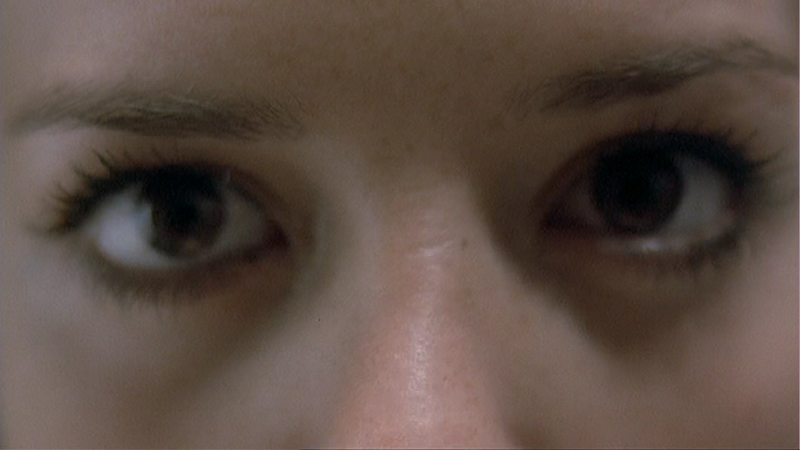
When Matt announced his idea for "The Close-Up Blog-a-thon" I got excited. I thought I would contribute a whole bunch of posts like Odie. School, alas, takes a lot of time away from blogging since my schooling is a bunch of reading and a bunch of writing. Combine that with a renewed Netflix account and you've got a lot of time filling up. But I'm trying to slow my roll on the Netflix Q, and move from near-constant consumption to more respective production via reflection. That is, I want to write more about more of the movies I watch.
 For instance, I'm taking a course called "The Action Film." It's a ton of fun. The filmography is packed with cool movies and we get to watch them in a big room on campus complete with powerful surround sound that was built in honor of the man who started UC Berkeley's Film department. Last week we watched John Woo's Hard Boiled. It was perhaps the most riotous screening yet, which is saying something a week after jailbird McTiernan's Predator. I thought I might try to write about that close-up at the end of the first firefight, where Chow Yun Fat gets blood splattered all over his flour-covered white face after he shoots a dude in the face at close range. It's a shocking moment and my classmates sure did jump. What's cool about it, though, is it's just another moment for Woo to color his melodrama. It's really no different from how Pedro Almodovar shoots a lot of Matador, which is also after the melodrama of classic Hollywood (like Sirk, like Duel in the Sun). But a whole essay seemed too much.
For instance, I'm taking a course called "The Action Film." It's a ton of fun. The filmography is packed with cool movies and we get to watch them in a big room on campus complete with powerful surround sound that was built in honor of the man who started UC Berkeley's Film department. Last week we watched John Woo's Hard Boiled. It was perhaps the most riotous screening yet, which is saying something a week after jailbird McTiernan's Predator. I thought I might try to write about that close-up at the end of the first firefight, where Chow Yun Fat gets blood splattered all over his flour-covered white face after he shoots a dude in the face at close range. It's a shocking moment and my classmates sure did jump. What's cool about it, though, is it's just another moment for Woo to color his melodrama. It's really no different from how Pedro Almodovar shoots a lot of Matador, which is also after the melodrama of classic Hollywood (like Sirk, like Duel in the Sun). But a whole essay seemed too much.In the end I wrote up a music video. When they work, music videos can be really alive and beautiful, not just shill tactics. And it's really weird (cool?) to me that Juvenile's first hit single, "Ha," was even chosen as a marketable single. Sure, it's got a killer hook, but the fact that you can't hear/understand fuck-all he's saying around the hook (at least at first) is pretty odd for a lead single. On top of that, the video is a kind of minor masterpiece blending the artificial performances with this queasy-distanced "documentary" footage. So I fumbled around with it and came up with this piece.
Another thing that flashed in my head when thinking about close-ups were past posts here that focused on screenshots of close-ups (or any striking compositions) as a visual kind of criticism. I'll let the images do the talking, so I grouped some links to those here, in chronological order:
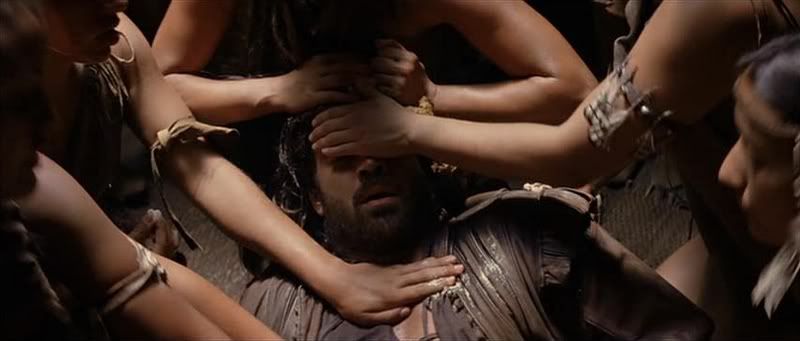
A Happy New World New Year looks at some rhyming images from Terrence Malick's masterpiece.
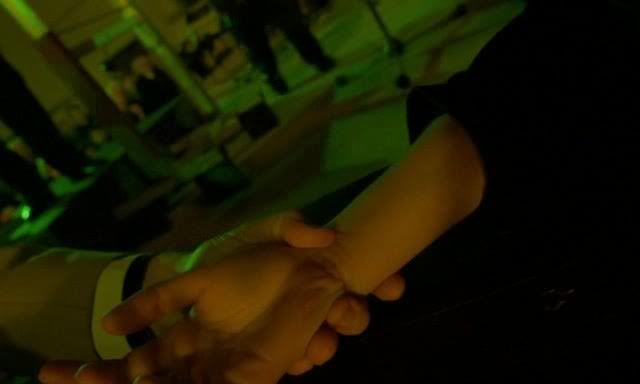
Born Under Punches: Véronique's hands offers some key images of Irène Jacob's tactile performance.
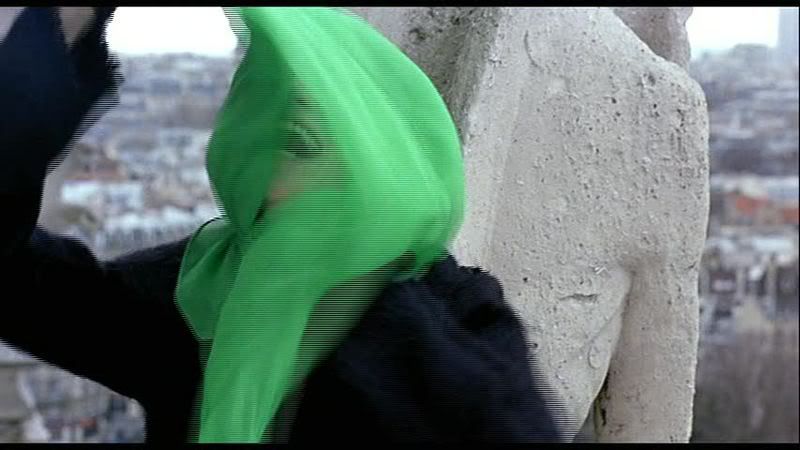
Evergreen syrup screenshot/s for the day peeks at a delicious moment in Claire Denis' Trouble Every Day that seems to get forgotten amongst all the bloodletting.
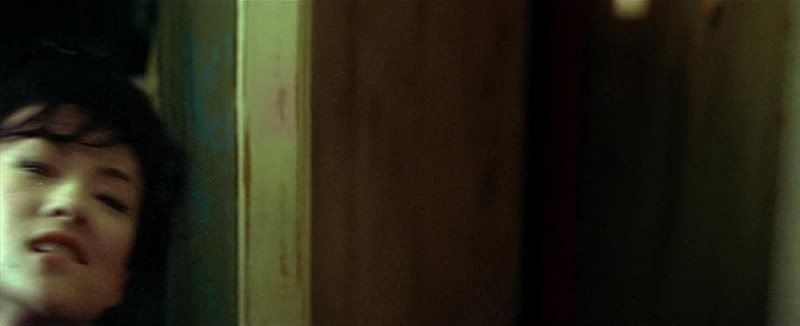
On A Dime Screenshots for the day delights in Zhang Ziyi's multifaceted facial expressions in one sequence from Wong Kar Wai's 2046.
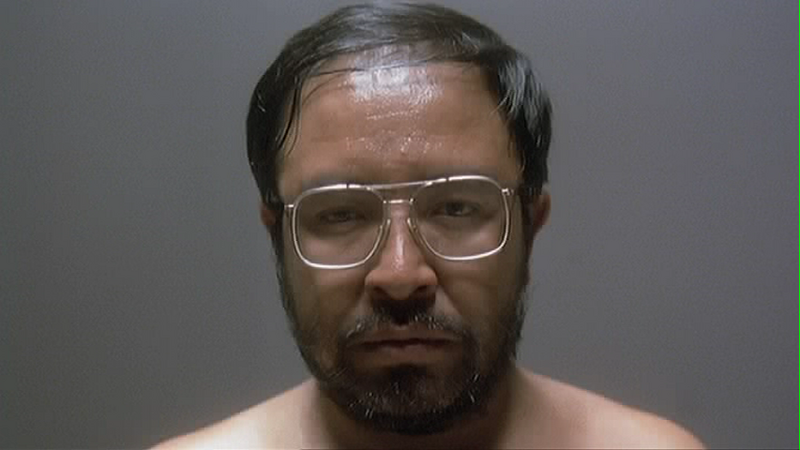
CINCO DE VINYL: Negotiating Battle in Heaven looks at Carlos Reygadas' second feature as more than just a bad-boy routine.
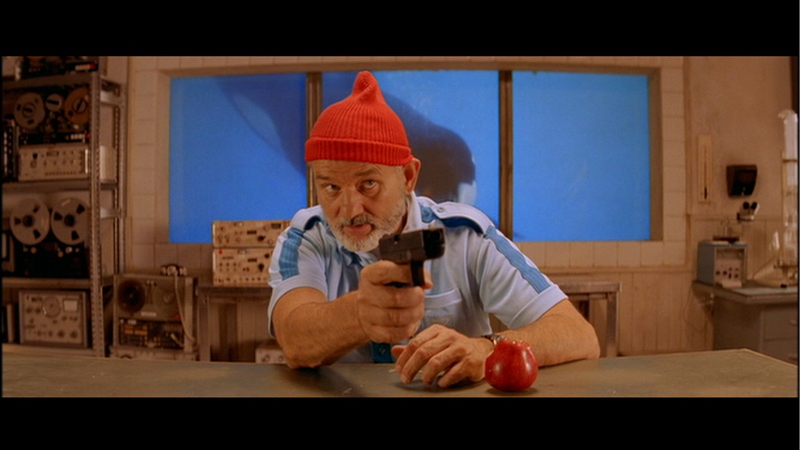
Fake screenshot for the day, or evening is a quote from The Life Aquatic.
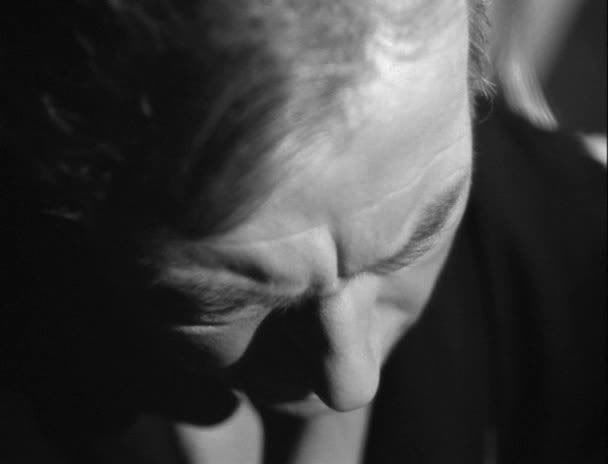
Claude Rains for the day is a brief reflection on a key moment in Hitchcock's Notorious.
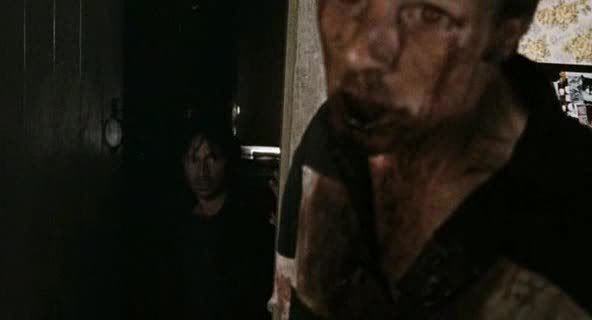
Exploding heads, and hearts: 28 Weeks Later is thick with blood. tries its best to convey the weight of said film's brilliant opening sequence by grabbing key frames of blood, and eyes.
You can also simply click the tag "screenshot" below and see all these posts simultaneously, plus some others. But this looks pretty good, right? Oh yeah, here's the Juvenile video:
Posted by
Ryland Walker Knight
at
11:58 AM
3
grooves
![]()
Labels: beauty, blog-a-thon, blogging, Carlos Reygadas, Claire Denis, Kieslowski, reflection, rwk, screenshot, The House, The New World, Wes Anderson, Ziyi Zhang
Tuesday, September 04, 2007
Maurice Merleau-Ponty = ballin out of control.
RWK says: Phenomenology late at night might not make much sense (you need some lamps) but it still tickles the brain. I read an essay by Maurice Merleau-Ponty over the weekend called "The Intertwining -- The Chiasm" and it rocked me silly. I decided I would make myself a little crazy and type in a foundational paragraph. It's long, as you will see. And, as you will see, the words are images as much as any jpg would be in here so sit up close and read closer still. But I won't blame you for tuning out and scrolling (or clicking) away real quick: it's not easy. But it sure is beautiful.
If we turn now to the seer, we will find that this is no analogy or vague comparison and must be taken literally. The look, we said, envelops, palates, espouses the visible things. As though it were in a relation of pre-established harmony with them, as thought it knew them before knowing them, it moves in its own way with its abrupt and imperious style, and yet the views taken are not desultory—I do not look at a chaos, but at things—so that finally one cannot say if it is the look or if it is the things that command. What is this prepossession of the visible, this art of interrogating it according to its own wishes, this inspired exegesis? We would perhaps find the answer in the tactile palpation where the questioner and the questioned are closer, and of which, after all, the palpation of the eye is a remarkable variant. How does it happen that I give to my hands, in particular, that degree, that rate, and that direction of movement that are capable of making me feel the textures of the sleek and the rough? Between the exploration and what it will teach me, between my movements and what I touch, there must exist some relationship by principle, some kinship, according to which they are not only, like the pseudopods of the amoeba, vague and ephemeral deformations of the corporeal space, but the initiation to and the opening upon a tactile world. This can happen only if my hand, while it is felt from within, is also accessible from without, itself tangible, for my other hand, for example, if it takes its place among the things it touches, is in a sense one of them, opens finally upon a tangible being of which it is also a part. Through this crisscrossing within it of the touching and the tangible, its own movements incorporate themselves into the universe they interrogate, are recorded on the same map as it; the two systems are applied upon one another, as the two halves of an orange. It is no different for the vision—except, it is said, that here the exploration and the information it gathers do not belong “to the same sense.” But this delimitation of the senses is crude. Already in the “touch” we have just found three distinct experiences which subtend one another, three dimensions which overlap but are distinct: a touching of the sleek and of the rough, a touching of the things—a passive sentiment of the body and its space—and finally a veritable touching of the touch, when my right hand touches my left hand while it is palpating the things, where the “touching subject” passes over to the rank of the touched, descends into the things, such that the touch is formed in the midst of the world and as it were in the things. Between the massive sentiment I have of the sack in which I am enclosed, and the control from without that my hand exercises over my hand, there is as much difference as between the movements of my eyes and the changes they produce in the visible. And as, conversely, every experience of the visible has always been given to me within the context of the movements of the look, the visible spectacle belongs to the touch neither more nor less than do the “tactile qualities.” We must habituate ourselves to thinking that every visible is cut out in the tangible, every tactile being in some manner promised to visibility, and that there is encroachment, infringement, not only between the touched and the touching but also between the tangible and the visible, which is encrusted in it, as, conversely, the tangible itself is not a nothingness of visibility, is not without visual existence. Since the same body sees and touches, visible and tangible belong to the same world. It is a marvel too little noticed that every movement of my eyes—even more, every displacement of my body—has its place in the same visible universe that I itemize and explore with them, as, conversely, every vision takes place somewhere in the tactile space. There is double and crossed situating of the visible in the tangible and of the tangible in the visible; the two maps are complete, and yet they do not merge into one. The two parts are total parts and yet are not superposable.
Posted by
Ryland Walker Knight
at
11:56 PM
2
grooves
![]()
Labels: appreciation, beauty, blogging, Maurice Merleau-Ponty, philosophy, reflection, rhetoric, rwk
Monday, September 03, 2007
Poem for the day: The Ister, first strophe
Now come, fire!
Eager are we
To see the day,
And when the trial
Has passed through our knees,
May someone sense the forest's cry.
We, however, sing from the Indus
Arrived from afar and
From Alpheus, long have
We sought what is fitting,
Not without pinions may
Someone grasp at what is nearest
Directly
And reach the other side.
Here, however, we wish to build.
For rivers make arable
The land. Whenever plants grow
And there in summer
The animals go to drink,
So humans go there too.
[Friedrich Hölderlin]
[Also, I'd like to see this film called _The Ister_, now. But who knows when that will happen. Maybe I shall, indeed, return to Netflix. More on that later, I hope. (The experiment is coming to a close, I fear, with little participation on my part. Or, less than hoped.) Hope is funny, wreckless. Be here now, be well, be liquid.]
[Can't wait for that _Sans Soleil_ DVD to arrive. Talk about liquid.] --RWK
Saturday, September 01, 2007
Sunset for the evening.
Posted by
Ryland Walker Knight
at
10:29 PM
3
grooves
![]()
Labels: beauty, blogging, event, images, rhetoric, rwk, technology, west coast
Thursday, August 02, 2007
The joy we're left with here and now.
 I MEAN IT:
I MEAN IT:
Loan your friend a wrench, see a movie on a big fucking screen, kiss your lover for an hour, eat a tunafish sandwich, or some hummus and pita, do a bedroom dance, maybe cry a bit, listen to this song, read your favorite poem a few times, slouch a little towards Bethlehem, give The White Album a spin, tread that thin red line of ______________, wrap me in your marrow, stuff me in your bones, take off the iPod, run to the park and toss a baby in the air, smile, drink a beer, cut your hair, cuss like a goddamned cocksucking sailor, chips and salsa, remember Ingmar Bergman and Michelangelo Antonioni, read my silly tribute at The Daily Cal, delight in Dan Callahan's at The House Next Door, swim in a river, throw stones and baseballs and break sticks across your knee, gather yourself up and meet the sunshine. But once the sun has set, go inside and watch a great film on as big a screen as possible.
BIG SCREEN LOVE, BIG SCREEN LIFE
[RWK]
Posted by
Ryland Walker Knight
at
8:38 AM
1 grooves
![]()
Labels: Antonioni, appreciation, beauty, Bergman, blogging, Daily Cal, list, movie magic, reflection, rwk, The House
Tuesday, July 17, 2007
Weekend exegesis, of sorts, in flashes, with some linkage.
by Ryland Walker Knight
 Tonight I thought I was going to the PFA, yet again, to see a pair of Barbara Stanwyck films: Baby Face (1933), directed by Alred E Green, and Remember The Night (1940), directed by Mitchell Leisen from a screenplay by Preston Sturges. Instead, after walking up past the theatre and seeing a line across the lobby for tickets, a mysterious force (sometimes called "conscience") pulled me away. That, and I thought about my bank account. From there I thought I would find a place to sit and read in the fading sun as Austin's How To Do Things With Words
Tonight I thought I was going to the PFA, yet again, to see a pair of Barbara Stanwyck films: Baby Face (1933), directed by Alred E Green, and Remember The Night (1940), directed by Mitchell Leisen from a screenplay by Preston Sturges. Instead, after walking up past the theatre and seeing a line across the lobby for tickets, a mysterious force (sometimes called "conscience") pulled me away. That, and I thought about my bank account. From there I thought I would find a place to sit and read in the fading sun as Austin's How To Do Things With Words Thursday saw me travel into San Francisco to see Cassavetes' late, masterful work Love Streams at the Yerba Buena Center for the Arts' Screening Room. Brian Darr was in attendance and we shared some tired words on our walk to public transportation but really I was elated. I couldn't have expected to have seen such a joyful film. My expectations were to have my heart pummeled, not caressed. Which isn't to say the film is one jolly scene after another. No, it's still tough. But it's also hilarious, and tender. It spurred me on to write this text message, waiting on the BART platform: "U must see some Casavettes [sic]. Talk about joy and the affirmative life. I'm floating, drinking life here, in clouds." The amount of love on display, streaming, in this film is staggering. It made me think I would be willing to risk seeing all of the rest of his oeuvre ASAP, even the ones I have seen, since I think they will all play new, as if viewed for the first time, with different eyes, and a different heart. Then I remembered how I felt after Woman Under The Influence and the project went (rightly) on a back burner. I would like to see Love Streams again before I write any more about it. Suffice it to say, it warrants the praise it has earned, as has its maker.
Thursday saw me travel into San Francisco to see Cassavetes' late, masterful work Love Streams at the Yerba Buena Center for the Arts' Screening Room. Brian Darr was in attendance and we shared some tired words on our walk to public transportation but really I was elated. I couldn't have expected to have seen such a joyful film. My expectations were to have my heart pummeled, not caressed. Which isn't to say the film is one jolly scene after another. No, it's still tough. But it's also hilarious, and tender. It spurred me on to write this text message, waiting on the BART platform: "U must see some Casavettes [sic]. Talk about joy and the affirmative life. I'm floating, drinking life here, in clouds." The amount of love on display, streaming, in this film is staggering. It made me think I would be willing to risk seeing all of the rest of his oeuvre ASAP, even the ones I have seen, since I think they will all play new, as if viewed for the first time, with different eyes, and a different heart. Then I remembered how I felt after Woman Under The Influence and the project went (rightly) on a back burner. I would like to see Love Streams again before I write any more about it. Suffice it to say, it warrants the praise it has earned, as has its maker.Friday saw me take in a pair of new-Asian films at the PFA. More on that over at The House. [I can also say Friday also saw me accept a job offer, but that's about it for now.]
 Saturday started with a matinée of Harry Potter and the Order of the Phoenix in downtown Berkeley. Overall I was impressed. Not as much as Walter Chaw, I don't think, but his review is pretty great. The girl who plays Luna, Evanna Lynch, is remarkable, and oddly adorable. The chemistry she and Harry (a much-improved and only improving Daniel Radcliffe) share is enough to make one wish they would end up together, despite all the obvious foreshadowing that Ginny is The Girl For The Boy Who Lived. Plus, it's always a delight to see all the famous British actors pop up for some fun. I think the set pieces will only be better in the sixth movie since director David Yates will be more familiar with the process. However, the FX still probably won't match those of Cuarón's third film because those were all there to serve the story. The FX here, while mostly stellar, are mostly window dressing. But more on that later, after the seventh book at week's end. [Saturday ended with a ton of dancing, which was fun.]
Saturday started with a matinée of Harry Potter and the Order of the Phoenix in downtown Berkeley. Overall I was impressed. Not as much as Walter Chaw, I don't think, but his review is pretty great. The girl who plays Luna, Evanna Lynch, is remarkable, and oddly adorable. The chemistry she and Harry (a much-improved and only improving Daniel Radcliffe) share is enough to make one wish they would end up together, despite all the obvious foreshadowing that Ginny is The Girl For The Boy Who Lived. Plus, it's always a delight to see all the famous British actors pop up for some fun. I think the set pieces will only be better in the sixth movie since director David Yates will be more familiar with the process. However, the FX still probably won't match those of Cuarón's third film because those were all there to serve the story. The FX here, while mostly stellar, are mostly window dressing. But more on that later, after the seventh book at week's end. [Saturday ended with a ton of dancing, which was fun.]Sunday was mild, and highlighted by an encore showing of Syndromes and a Century. I would watch that movie again right now.
Monday was a writing day, but it had enough spare time for me to watch this week's episode of John From Cincinnati, which slayed me (as it did Keith). The simultaneity of the final ten minutes was breathtaking. So far, so good: the payoff here was well worth the previous weeks. Austin Nichols has the thankless title role and he's superb but it's really all about how Emily Rose pouts her way through hers that touches me. But, when you hear such a speech as this, it's hard not to go slack-jawed and, in the end, say with certainty, "Well. This was time well spent."
"If my words are yours, can you hear my Father? Can Bill know my Father, keeping his eye on me? Can I bone Kai and Butchie know my Father instead?
"My Father's shy doing his business. Kai helps my Father dump out. Bill takes a shot. Shaunie is much improved.
"Joe is a Doubting Thomas. Joe will save Not-Aleman. Joe will bring his buddies home. This is how Freddy relaxes. Cup-o'joe, and Winchell's variety dozen.
"Mitch catches a good wave. Mitch wipes out. Mitch wipes out Cissy. Cissy shows Butchie how to do that. Cissy wipes Butchie out. Butchie hurts Barry's head. Mister Rollins comes in Barry's face. My Father runs the Mega-Millions.
"Fur is big. Mud is big. The stick is big. The word is big. Fire is huge. The wheel is huge. The line and circle are big. On the wall, the line and circle are huge. On the wall, the man at the wall makes a man from the circle and line. The man at the wall makes a Word on the wall from the circle and line. The Word on the wall hears my Father.
"The zeroes and ones make the Word in Cass's camera. In the Word on the wall that hears my-Father-in-Cass's-camera, the good one Mitch catches doesn't wipe Cissy out. In the-Word-that-hears-my-Father, Cissy shows Butchie something else. In-my-Father's-Word, Cissy shows Butchie in Shaun. In-my-Father's-Word, Tina raises Shaun at lunch. In Cass's-camera, Butchie lays the court out for Barry, and Mister Rollins watches, and he doesn't come on Barry's face. In Cass's-camera, Butchie knows Kai kept the faith. In-my-Father's-Word, the Wave lifts them up.
"In Cass's camera, Bill doesn't bump his head on the stairs. In Cass's-camera, as long as he's being stupid, Bill gives Lois a kiss.
"In His-Word-in-Cass's-camera, the Internet is big. Nine-Eleven is big, but not every towel-head is eradicated. In His-Word, We are coming Nine-Eleven-Fourteen.
"In my-Father's-Word, Bill sees how Freddy relaxes. In Cass's-camera, Ramon wants to know who's hungry, in the courtyard and Room Forty-Five.
"In my-Father's-Word-to-come-in-Cass's-camera, Doctor Smith calls Ocean Properties. In Cass's-camera-to-come, my Father stares Not Aleman down, and Freddy sees Bill much-improved.
"You will not note my-Father's-Word, nor remember Cass's-camera, but you will not forget what we did here."
Tuesday, today, has been pretty good. I want to end it even better. So I'm going to go read, and maybe drink a beer or three. Then tomorrow I may finally write up my real reaction to Deadwood's second season. For now, enjoy that delovely opening credit sequence from Milch's new baby while I skeedaddle on out of here and catch my own point break.
Posted by
Ryland Walker Knight
at
8:08 PM
1 grooves
![]()
Labels: beauty, blogging, Cassavetes, David Milch, Harry Potter, list, LOOK nerd, movie magic, reflection, rwk, The House
Monday, July 16, 2007
We humans: Deadwood beauty (and a poem) for the evening.





by Ryland Walker Knight
From the Season One finale, "Sold Under Sin," my favorite moment thus far in the series, among many, involves Jewel and Doc, dancing at The Gem, to the new fucking piano while Al watches on, all the love in the world beaming down over his bar, his world, his dear ones. But it's the exchange between the foreground characters that really tears me apart:
Jewel: Say, "I'm as nimble as a forrest creature."
Doc: You're as nimble --as a forrest creature. [Al racks into focus in the background.]
Jewel: No... say it about yourself.
Doc: I'm. As nimble. As a forrest creature. [Focus racks back as the two laugh.]
Ryland wells up and sighs: We humans.
I didn't think I would share this but to tide us over until I can write out a proper, respectful tribute to the brilliant second season, which I finished last week, I offer a silly poem I wrote upon finishing that last episode, "Boy The Earth Talks To." I say silly because, well, it's a fucking poem about fucking Deadwood. Who am I? Did I really do that? Well, yes. And seriously, this shit is amazing. My friend said, in an email, "Its meaning has, regrettably, been narrowed to refer to the publicized donations of rich douchebags, but philanthropist is the cognate opposite of misanthrope; one who loves humanity." That's David Milch, if you ask me:
I cannot explain my heart
yet I persist across prose and in
the heretofore poesy of land
and, of bondage in trust, to say love
along your broadest passages: may
they yield tidings--vivacious fucking tidings!
For we humans persist amongst one another
as would trees, or dirt, or running water,
along time's cocksucker coarsities. We run
forward, forever, in vain hope planking
aspirations groove into groove eased
with whiskey and with tastings bittersweet
on the whole. We run forward bonded
to our others as is the forrest, as is the land, as is the river,
as are the planks and words we choose to
erect our boundaries and, and, and say our
peoples' union, bursting in flight away to the heavens
however earth-bound we remain.
However earth-bound we remain we run forward.
You allow it, abide it, assuage its wounds and
work angles congruent and variant to shift
yourself in the world to meet it.: you run forward with us.
Prospects of protection wash with waste past
the crosshatch and catch the current. But run.
I see the heart all round in eyes and other
appendages. I see your prospects linger and wash
and fall to embrace earth as well arms as well
technology's arrival. I see arrivals spell and spare too little
for us little in such shadows of promise and blood.
I see cocksuckers everywhere.
Running, bounded in light as in spirit, the
union will grow lofty and tenuous; time folds in
more than out, we forget. But run, and let us live
as we are now, however the path may fucking fork.
Death halts but tomorrow is another day for us alive
and running in the current tidings of time. Less we
believe, less we may remember: the promise does not halt
but persist, across it all, in colors whipped west by wind as much as water.
Or gold, or blood, or vices untold. We abide it all
somehow, here, in the warmth of the breast. Pound
the hardwood and the flesh and the porcelain, too, for we run
and burst ever on, forward, as one to oneself and as one to one
and as one all, cocksuckers everywhere.
More later, as ever, I promise. The fucking blogger photos suck, I know, but I'm too lazy to put up the photobooth ones like I normally do... you can trace the progress, right? You can taste the light, right? Enjoy it, your life. It's short.



